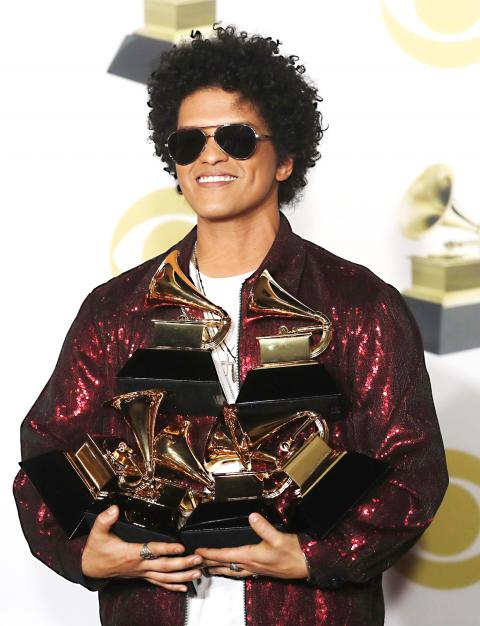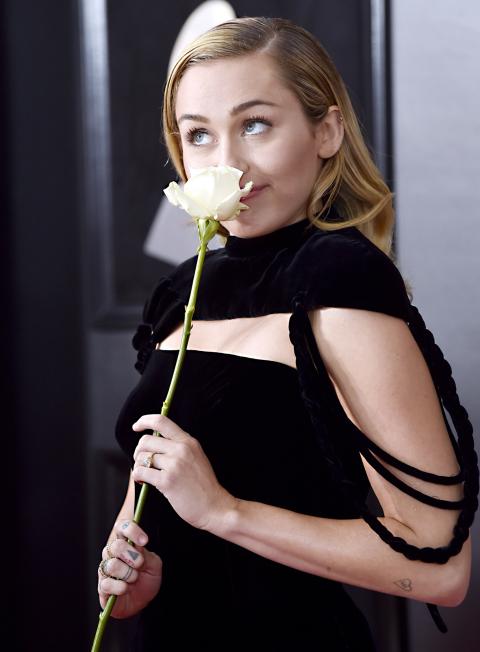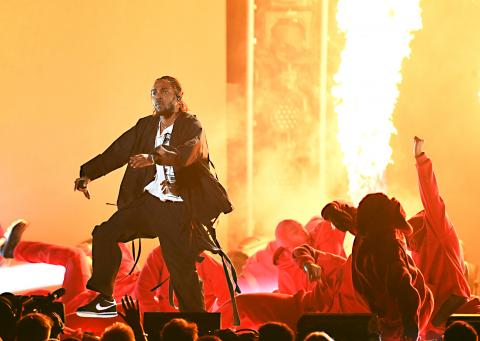The Grammy Awards seemed poised to make this a triumphant year for rap at music’s showcase event — until Bruno Mars crashed the party.
The song-and-dance man from Hawaii won all six awards he was nominated for on Sunday night, including the three most prestigious Grammys for song (That’s What I Like), record (24K Magic) and album of the year. His music also dominated the rhythm and blues categories.
The Grammys also saw Kendrick Lamar win five awards, Jay-Z go home empty-handed, some memorable performances by the likes of Lamar, Kesha, Mars and Logic, an odd oversight of singer Lorde and a surprise cameo from Hillary Clinton.

Photo: Reuters
In accepting a trophy for the album 24K Magic, Mars recalled when he was 15 years old and singing shows for tourists. He’d perform hits written by Babyface, Teddy Riley and Jimmy Jam & Terry Lewis, and loved looking down from the stage to see people from all over the world who had never met dancing together and toasting one another.
“All I ever wanted to do with this album was that,” he said. “These songs were written with nothing but joy.”
Mars has won 11 Grammys in his career.

Photo: AP
His success, however, instantly became a target for second-guessers, similar to people befuddled last year when Adele won album of the year over Beyonce. Social media filled with commentary about whether Lamar’s hard-hitting disc DAMN was more deserving. One meme that spread on Twitter showed Houston Rocket James Harden rolling his eyes in supposed “reaction” to the news.
Beyond being a critical favorite, Lamar seemed primed to be the evening’s star. He opened the Grammys with a hard-hitting medley that depicted black dancers falling to the floor to symbolize being shot, and won the night’s first televised award. His work swept the rap categories, the prime factor in the night’s most-nominated artist, Jay-Z, winning nothing.
Lamar paid tribute to Jay-Z (“Jay-Z for president,” he said with a smile) and other forebears in accepting a Grammy.

Photo: AFP
“I thought it was about the accolades and the cars and the clothes,” he said. “But it really is about expressing yourself and putting that paint on the canvas for the world to evolve for the next listener, the next generation after that. Hip-hop has done that for me.”
PLATFORM FOR CAUSES
Clinton’s appearance was the punch line for a skit where host James Corden pretended to cast celebrities for what he thought would be a sure-fire Grammy contender for spoken world performance next year, reading from Michael Wolff’s best-seller about the Trump administration, Fire and Fury. Cher, John Legend and Snoop Dogg left him frustrated, but then Clinton lowered a copy of the opened book in front of her face to reveal herself.
The attempt at humor wasn’t a hit with everyone: Donald Trump’s ambassador to the UN, Nikki Haley, tweeted that the skit ruined the show for her.
Most of the show’s political references — to topics like gun violence, immigration reform and women’s rights — were carefully scripted.
Kesha was joined by Cyndi Lauper, Camila Cabello, Julia Michaels, Andra Day and others in a performance of her Grammy-nominated song Praying, which is about fighting back from abuse. Singer Janelle Monae introduced Kesha and tied the appearance to the current flood of women speaking up about sexual misconduct. Dozens of artists and music industry players also sported white roses in support of the Time’s Up and #MeToo movements against sexual abuse and harassment.
“We come in peace but we mean business. To those who would dare try to silence us, we offer two words: Time’s Up,” Monae said. “It’s not just going on in Hollywood. It’s not just going on in Washington. It’s here in our industry, too.”
OTHER TIDBITS
The show also featured a somber performance of Eric Clapton’s Tears in Heaven by country artists Maren, Eric Church and the Osborne Brothers. All were on the bill for the Las Vegas show in October of last year that was torn apart by a mass shooter.
Social media was curious about the seeming snub of album of the year nominee Lorde. She wasn’t among the night’s performers, even as classic rockers Sting and U2 made multiple appearances.
“It’s hard to have a balanced show and have everybody involved,” producer Ken Ehrlich said backstage. “Every year’s different. We can’t have a performance from every nominee.”
The Grammys were also a clear example of rock ‘n’ roll’s decline as a creative force. No rock awards were given during the televised portion of the Grammys. Sting sang a 30-year-old hit and the majority of rock’s references were about artists who had died like Chuck Berry, Fats Domino and Tom Petty.
The Rolling Stones, once judged rock’s kingpins, won the third Grammy of their career — for best traditional blues recording.
Alessia Cara won the Grammy for best new artist, and remembered the time when she would “win” Grammys in her dreams while singing in the shower.
Chris Stapleton won three Grammys in country categories. Other multiple winners included Ed Sheeran, CeCe Winans, Justin Hurwitz and Jason Isbell.
The late Leonard Cohen won a Grammy for his performance of You Want it Darker. Actress Carrie Fisher and sound engineer Tom Coyne were other posthumous winners.
As it has in recent years, the Grammys downplayed the awards for performances by the industry’s biggest stars. Highlights included Mars and Cardi B dueting on Finesse; Rihanna, DJ Khaled and Bryson Tiller on Wild Thoughts; and Patti Lupone’s Broadway classic Don’t Cry For Me Argentina.

June 2 to June 8 Taiwan’s woodcutters believe that if they see even one speck of red in their cooked rice, no matter how small, an accident is going to happen. Peng Chin-tian (彭錦田) swears that this has proven to be true at every stop during his decades-long career in the logging industry. Along with mining, timber harvesting was once considered the most dangerous profession in Taiwan. Not only were mishaps common during all stages of processing, it was difficult to transport the injured to get medical treatment. Many died during the arduous journey. Peng recounts some of his accidents in

“Why does Taiwan identity decline?”a group of researchers lead by University of Nevada political scientist Austin Wang (王宏恩) asked in a recent paper. After all, it is not difficult to explain the rise in Taiwanese identity after the early 1990s. But no model predicted its decline during the 2016-2018 period, they say. After testing various alternative explanations, Wang et al argue that the fall-off in Taiwanese identity during that period is related to voter hedging based on the performance of the Democratic Progressive Party (DPP). Since the DPP is perceived as the guardian of Taiwan identity, when it performs well,

A short walk beneath the dense Amazon canopy, the forest abruptly opens up. Fallen logs are rotting, the trees grow sparser and the temperature rises in places sunlight hits the ground. This is what 24 years of severe drought looks like in the world’s largest rainforest. But this patch of degraded forest, about the size of a soccer field, is a scientific experiment. Launched in 2000 by Brazilian and British scientists, Esecaflor — short for “Forest Drought Study Project” in Portuguese — set out to simulate a future in which the changing climate could deplete the Amazon of rainfall. It is

The Taiwan People’s Party (TPP) on May 18 held a rally in Taichung to mark the anniversary of President William Lai’s (賴清德) inauguration on May 20. The title of the rally could be loosely translated to “May 18 recall fraudulent goods” (518退貨ㄌㄨㄚˋ!). Unlike in English, where the terms are the same, “recall” (退貨) in this context refers to product recalls due to damaged, defective or fraudulent merchandise, not the political recalls (罷免) currently dominating the headlines. I attended the rally to determine if the impression was correct that the TPP under party Chairman Huang Kuo-Chang (黃國昌) had little of a